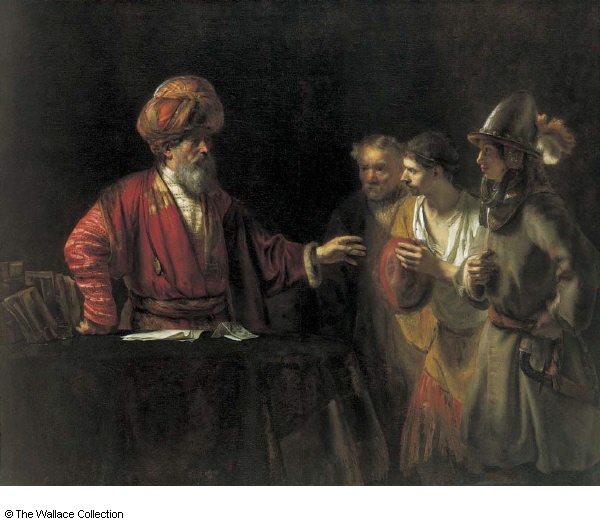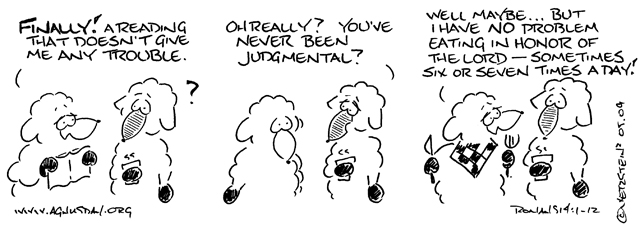Matthew 18:21-35

The Centurion Cornelius


Waterfall in Nancy's
yard. They had a very belated
and delightful birthday luncheon
for me on Tuesday!

CV with the beret Nancy made for
her. She won a big
award at the Rocky Mountain
Watercolor Show!
Congratulations, CV!

Nancy with her childhood
tea set.

CV, Kathy,
Nancy

Lori and
Jackie

Thank
you, Gretchen!!! Gretchen and Gwen are cutting Gretchen's
farewell
cake at the Alzheimer's Association on Wednesday.
Gretchen is leaving the
Alzheimer's Association and is now
doing bereavement counseling with
Hospice.
Nobody ever forgets
where he buried the hatchet.
~ Kin
Hubbard
September 14,
2008 Twenty-fourth Sunday in Ordinary Time
1Welcome those who are weak in faith, but not for the
purpose of quarreling over opinions. 2Some believe in
eating anything, while the weak eat only vegetables.
3Those who eat must not despise those who abstain, and
those who abstain must not pass judgment on those who eat; for God has welcomed
them. 4Who are you to pass judgment on servants of
another? It is before their own lord that they stand or fall. And they will be
upheld, for the Lord is able to make them stand.
Romans 14:1-12

Agnus Day
appears with the permission of www.agnusday.org
Exodus
14:19-31
Psalm 114:1-8 or Exodus 15:1b-11, 20-21
Romans 14:1-12
Matthew
18:21-35
Intro to the passage; Matthew 18:21-35:
Jesus is asked a question - "How many times must we forgive someone?"
In typical fashion, Jesus answers the question with a story.
Note: - ancient rabbis taught that you must forgive someone 3 times
- 10,000 talents = 15 years wages
- 100 denarii = 100 days wagesPlease read the passage.
Iíd like to talk to you this morning about forgiveness. Iíve entitled this message, "Forgive and be Free!" because I believe that thatís the point of Jesusí story. Forgiveness is the path of freedom. Unforgiveness is a jail cell.
Now, Jesus makes this point in the strongest of terms. Once upon a time there was a king who wished to settle up his accounts, the loans & debts of his servants. One servant owed him an enormous amount --15 years wages. Now, there was no way that the servant could pay the king back that amount. But mercifully, the king has pity on him and forgives him the debt.
This is a very theological point that Jesus is making here. Heís saying that we owe a debt to God that we can never pay back. A holy, perfect, and loving God has created us and blessed us with every spiritual blessing, and yet we as human beings -- collectively and individually -- have squandered Godís blessings, have lived time & time again by less than the best we know. We could never make a payment to God to make up for all the sins of humanity and all the sins of our lives -- all the times we missed the mark & fell short of Godís will for our lives.
None of us have the capital or moral reserves to make such a payment. We are at the mercy of the King of Kings. And of course, the Good News is, a payment has been made in the life, death and resurrection of Jesus Christ. Our sins have been covered, blotted out, wiped away, removed from the books. We have been forgiven all our debts by the King who had mercy upon us.And so Jesus is saying, "I want that to sink in. "I want my mercy and grace to touch the very depths of your souls. "So that those of you who know that your debts are forgiven might be debt-forgivers of others. "In fact, when you pray say, ĎForgive us our debts as we forgive our debtors.í" "Because if my amazing grace has truly touched your lives then you wonít be able to keep it to yourself -- youíll be sharing that grace with others, youíll be a debt forgiver. "If not, youíll be like the servant who was forgiven a debt of 15 years wages and went out and wouldnít forgive someone who owed him 100 days wages."
When we donít forgive others, we look as silly as that ungrateful servant. So forgiveness is not an optional course for students of the Jesus. Itís not an elective, itís a required course. And the church has reminded us of this time & time again, but the church hasnít always helped us out a great deal it seems to me, because thereís still a lot of confusion today about what forgiveness really is.
Let me start by saying what forgiveness is NOT. Forgiveness is not excusing a wrong. What do we usually say when someone apologizes to us? "Thatís all right."
As if forgiveness is saying, "Itís OK what you did. Thatís all right. Donít worry about it.
"As a matter of fact, you could do it again any time." True forgiveness is really saying, "Itís NOT OK what you did, but I forgive you. Apology accepted." You forgive a wrong, not just something you can explain. What I think we should say when someone apologizes to us is, "I accept your apology." In fact, thatís exactly what weíre requesting when we say, "Please accept my apology."Ex. If I accidentally step on your foot and break your big toe, youíre not going to say to me, "Thatís all right. Itís all right what you did."
So, forgiveness is not excusing or explaining away a wrong. Itís acknowledging a wrong from your perspective and forgiving it anyway.
Forgiveness does not mean forgetting something. Thereís that strange phrase, "Forgive & forget" as if forgiveness & moving on meant totally removing something from your data base. Just because you canít forget an episode, doesnít mean you havenít forgiven someone for it. Forgiveness does not mean forgetting. Itís remembering and yet forgiving.
Forgiveness is also not to be confused with reconciliation.
Ex. When someone says, "Pastor, how often must I forgive my abusive husband?" She isnít really asking, "How many times must I forgive him?" Sheís really asking, "How many times must I put up with this?" (and the answer is, not once. Itís never a loving thing to allow someone to abuse you.) Sheís confusing forgiveness with tolerance and reconciliation. Forgiveness and reconciliation are two different things.
Letís talk about what forgiveness is. Fortunately there is someone named Lewis Smedes to help us. Smedes is a professor of Christian ethics at Fuller Theological Seminary in Pasadena, California. No one has written more thoroughly, eloquently, and powerfully about forgiveness. This past summer we had a book club on his book, The Art of Forgiving. At the end of the book he has a section entitled, "Just remember this."
We printed most of this section in your programs this morning.
Hereís the bulletin insert entitled, "Just Remember This"
1. We do our forgiving alone inside our hearts and minds; what happens to the people we forgive depends on them.
2. The first person to benefit from forgiving is the one who does it.
M. Scott Peck says: "The reason to forgive is for your own sake, for our own health. It is needed for healing, because if we hold onto our anger, we stop growing and our souls begin to shrivel."
3. Forgiving happens in three stages: We rediscover the humanity of the person who wronged us, we surrender our right to get even, and we wish that person well. (thatís how we know weíve truly forgiven someone, when we truly wish them well)
4. Forgiving is a journey; the deeper the wound, the longer the journey.
5. Forgiving does not require us to reunite with the person who broke our trust.
6. We do not forgive because we are supposed to; we forgive when we are ready to be healed.
7. Waiting for someone to repent before we forgive is to surrender our future to the person who wronged us.
8. Forgiving someone who breaks a trust does not mean that we give him his job back.
9. Forgiving is the only way to be fair to ourselves.
10. Forgivers are not doormats; to forgive a person is not a signal that we are willing to put up with what he does.
11. Forgiving is essential; talking about it is optional.
12. When we forgive,
we set a prisoner free and discover that the prisoner we set free . . . is us.
13. When we forgive we walk in stride with the forgiving God.
Closing Illustration: Corrie Ten Boom, a holocaust survivor who sheltered Jews during the war, was speaking at a church one night. After the service a former prison guard went to greet her and shake her hand. "Corrie, I was one of the guards in your wing, but now Iím a brother in the Lord." Corrie froze, and she could not shake his hand. This haunted her and she prayed for many weeks about it, asking God to take away all the bitterness and hatred she had inside. Then one day the former guard was in the audience again. And this time when he came through the line, she did extend her hand. And as she did, she felt freedom. She felt she had set herself free. She realized that forgiveness did not mean excusing what he had done, or explaining it away or forgetting it completely. Instead, forgiveness meant freeing herself--letting go of all the negative energy and being alive to God & to grace and contentment here in the present moment.
If youíre holding on to something this morning, ask a gracious God to set you free.
That is the miracle of forgiveness.